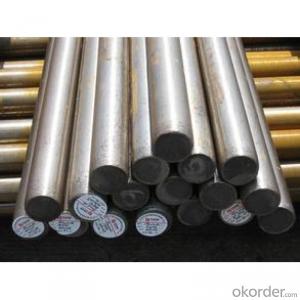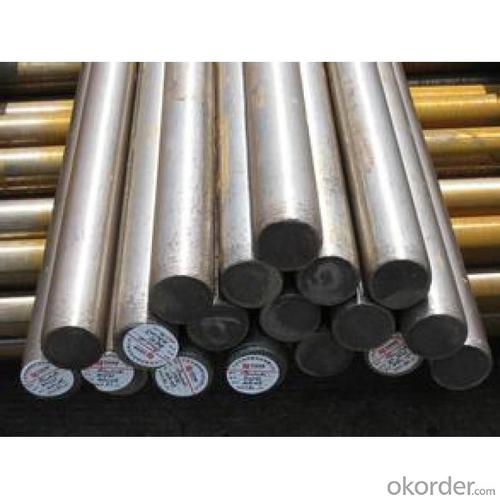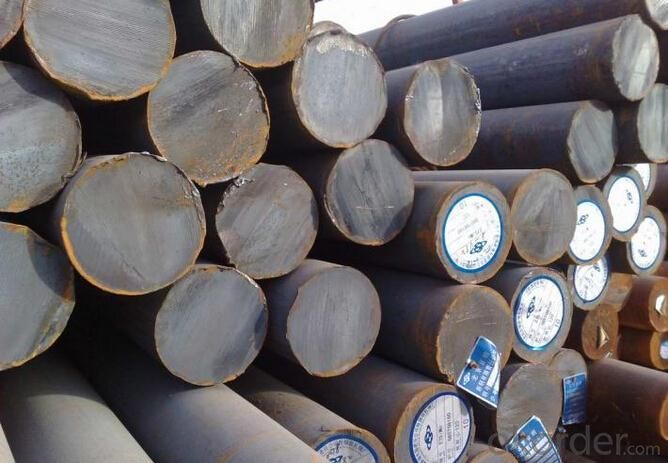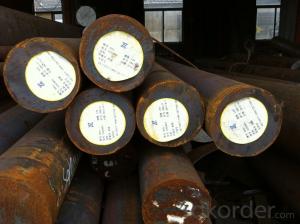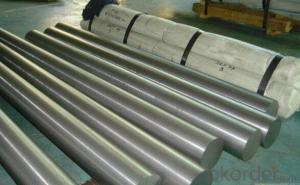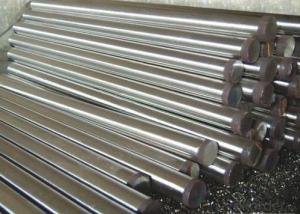Tool Steel Bar 40Cr Alloy Steel Round Bar
- Loading Port:
- China main port
- Payment Terms:
- TT OR LC
- Min Order Qty:
- 30 m.t.
- Supply Capability:
- 10000 m.t./month
OKorder Service Pledge
OKorder Financial Service
You Might Also Like
Specification
Tool Steel Bar 40Cr Alloy Steel Round Bar
Product information:
OD:10mm-1000mm
Length:As customer request
Grade:ASTM 1020/ ASTM 1035/ ASTM 1045/ ASTM 1050/ ASTM 1053/ ASTM 1566/ ASTM 5120/ ASTM 5140/ ASTM 4135/ ASTM 4142/ ASTM 1340/ ASTM 1541/ ASTM 1547/ ASTM 1022/ ASTM 1026/ ASTM 52100/ ASTM 4130 ……
DIN EN 1.0402/ DIN EN 1.0411/ DIN EN 1.0501/ DIN EN 1.0503/ DIN EN 1.0540/ DIN EN 1.7016/ DIN EN 1.7035/ DIN EN 1.7220/ DIN EN 1.7225/ DIN EN 1.5538/ DIN EN 1.0415/ DIN EN 1.7218/ DIN EN 100Cr6/ DIN EN 100CrMnSi6-4/ DIN EN 25CrMo4……And so on
Application:Applied to the equipment manufacturing industry, automobile, machinery industry and so on
Packaging:waterproof paper, steel strip packed. Or as customers requirement.
| Material: | 40Cr / 41Cr4 alloy steel specifications |
| Diameter: | 10mm-700mm |
| Length: | 3000mm-12000mm Straightness: 3mm/M max |
| Process: | EAF + LF + VD + Forged + Heat Treatment (optional) |
| Delivery condition: | Hot forged +Rough machined (black surface after Q/T)+ Turned (optional) |
| Delivery Time: | 30-45 days |
| MOQ: | 1 tons |
| Heat treatment: | Normalized / Annealed / Quenched / tempered |
| Technical Data: | According to the customer's requirement of Chemical Composition, Physical Properties and Mechanical Testing |
| Test: | Ultrasonic test according to SEP 1921-84 G3 C/c |
| Marking: | Grade, heat NO. length will be stamped one each bar with required color |
| Payment: | 30% advance by T\T, the balance against B/L |
| Application: | Statically and dynamically stressed components for vehicles, engines and machines. For parts of larger cross-sections, crankshafts, gears. |
Other product show:
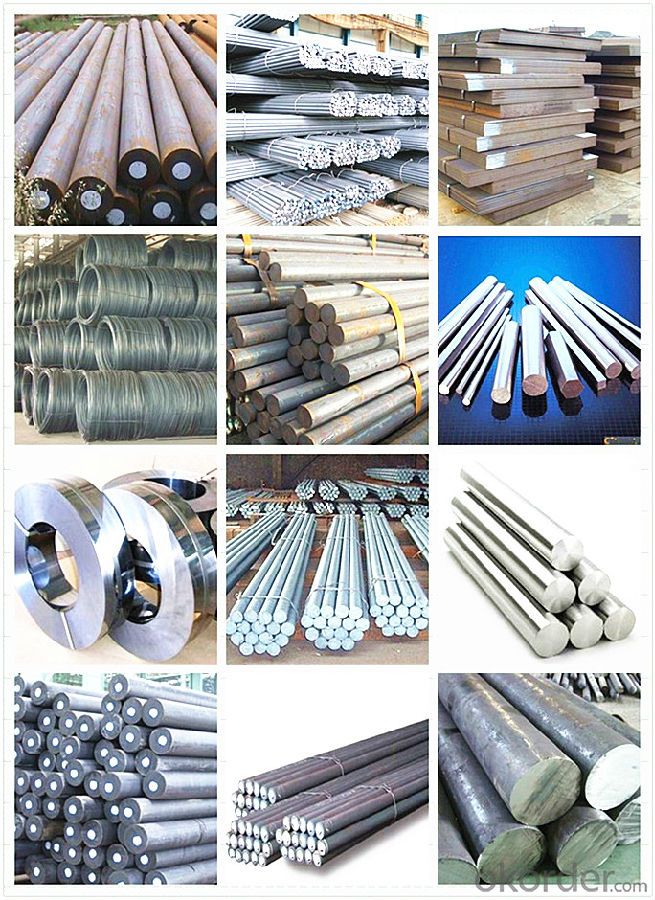
Our workshop show:
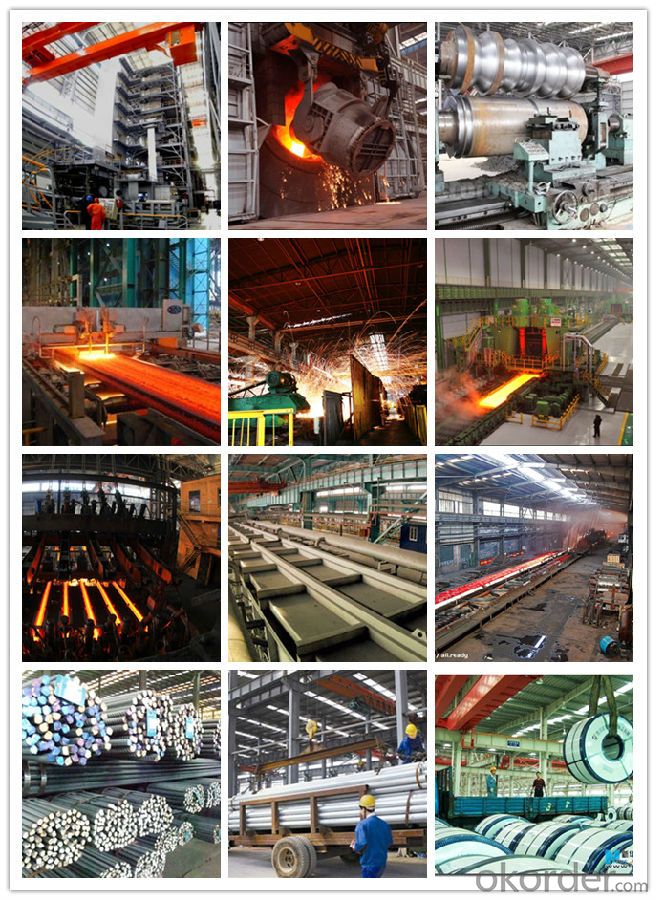
Our service:
-High manufacturing accuracy
-High strength
-Small inertia resistance
-Strong heat dissipation ability
-Good visual effect
-Reasonable price
Chose happens because of quality, then price, We can give you both.Additionally, we can also offer professional products inquiry, products knowledge train(for agents), smooth goods delivery, exellent customer solution proposals.Our service formula: good quality+good price+good service=customer's trust
SGS test is available, customer inspection before shipping is welcome, third party inspection is no problem.
If you need the sample, please feel free to let me know. Any question, we will contact you ASAP!
- Q: How does special steel perform in high-temperature mechanical applications?
- Special steel is specifically designed to perform exceptionally well in high-temperature mechanical applications. Unlike regular steel, special steel contains alloying elements such as chromium, nickel, and molybdenum, which enhance its heat resistance and mechanical properties. At high temperatures, special steel exhibits excellent strength and toughness, ensuring it can withstand the harsh conditions encountered in high-temperature environments. It retains its structural integrity even when exposed to extreme heat, making it suitable for applications such as furnaces, boilers, and gas turbines. Special steel also maintains its dimensional stability at elevated temperatures, which means it does not deform or warp easily. This property is crucial in high-temperature mechanical applications where precise dimensions and tight tolerances are required for optimal performance. Furthermore, special steel exhibits excellent corrosion resistance, even at high temperatures. This resistance is crucial in preventing the formation of oxide scales and reducing the risk of premature failure due to corrosion. In summary, special steel performs exceptionally well in high-temperature mechanical applications due to its enhanced heat resistance, strength, toughness, dimensional stability, and corrosion resistance. It provides reliability and durability in extreme heat conditions, making it a preferred choice for various industries where high-temperature environments are encountered.
- Q: Can special steel be used in the production of cutting tools?
- Yes, special steel can be used in the production of cutting tools.
- Q: What are the specific requirements for special steel used in the automotive piston industry?
- The specific requirements for special steel used in the automotive piston industry include high strength and durability, excellent wear resistance, good thermal conductivity, and the ability to withstand high temperatures and pressures. Additionally, the steel should have low thermal expansion and good machinability for ease of manufacturing and assembly.
- Q: What are the challenges in machining high-speed special steel?
- Several challenges arise when machining high-speed special steel due to its unique properties and characteristics. Its extreme hardness presents one of the main obstacles, making cutting and shaping difficult. High-speed special steel typically has a high carbon content and undergoes heat treatment to enhance its hardness, resulting in increased wear on cutting tools. The increased hardness of this steel also leads to elevated heat generation during the machining process. This heat can cause thermal distortion and impact the dimensional accuracy of the final product. To counteract this, specialized cooling techniques and cutting tools with advanced coatings must be used to dissipate heat and maintain stability. Another challenge is the brittleness of high-speed special steel. It tends to have low toughness and is susceptible to cracking and chipping during machining operations. To minimize the risk of tool failure and excessive stress, careful selection of cutting parameters such as cutting speed, feed rate, and depth of cut is necessary. Furthermore, high-speed special steel often contains alloying elements like tungsten, vanadium, and cobalt, which can further complicate the machining process. While these elements increase the strength and wear resistance of the steel, they also make it more challenging to machine. Effective machining of these alloys and achieving desired surface finishes requires specialized tool materials and cutting strategies. Additionally, the cost of high-speed special steel is often significantly higher than that of conventional steels, adding to the challenges of machining. The high tooling costs associated with the cutting tools required for machining this steel can be a substantial investment. Overall, machining high-speed special steel necessitates advanced cutting techniques, specialized tooling, and careful consideration of cutting parameters to overcome the challenges posed by its extreme hardness, brittleness, and alloying elements.
- Q: How does special steel ensure dimensional stability?
- Special steel ensures dimensional stability through a combination of factors such as controlled composition, precise heat treatment, and careful manufacturing processes. The specific composition of special steel is designed to have a lower coefficient of thermal expansion, which means it expands and contracts less with changes in temperature compared to regular steel. This ensures that the dimensions of the steel remain stable even under varying temperature conditions. Additionally, the heat treatment process further enhances the dimensional stability by refining the microstructure and reducing internal stresses. The careful manufacturing processes, including precise machining and quality control, also contribute to maintaining dimensional stability in special steel products.
- Q: How does special steel perform in terms of machinability?
- Special steel generally has good machinability due to its composition and properties. It is often designed or treated to have improved cutting and machining characteristics, such as increased hardness, toughness, and wear resistance. This allows for efficient and accurate machining operations, resulting in high productivity, better surface finish, and reduced tool wear. However, the machinability of special steel can vary depending on the specific grade, heat treatment, and machining conditions used.
- Q: What are the different methods of protecting special steel against corrosion?
- There exists a variety of techniques for safeguarding special steel from corrosion. Some commonly employed methods are as follows: 1. Application of Coatings: One of the most efficient approaches to prevent corrosion is to apply a protective coating onto the steel surface. This can be accomplished using diverse techniques like hot-dip galvanization, electroplating, or painting. The coatings act as a barrier, effectively preventing moisture and corrosive substances from coming into contact with the steel. 2. Utilization of Cathodic Protection: This method involves the use of either a sacrificial anode or an impressed current to shield the steel. In sacrificial anode cathodic protection, a more reactive metal is connected to the steel, thereby causing the sacrificial metal to corrode instead of the steel. Conversely, impressed current cathodic protection employs an external power source to provide a continuous flow of electrons, thus halting the corrosion process. 3. Alloying: The addition of specific elements to special steel can enhance its resistance against corrosion. For instance, stainless steel contains chromium, which forms a passive oxide layer on the surface, providing protection against corrosion. Likewise, the inclusion of elements like nickel, molybdenum, or copper can improve the steel's resistance to corrosion. 4. Passivation: Passivation is a chemical process that involves treating the steel with an acid solution to eliminate any impurities present on the surface. This process facilitates the formation of a protective oxide layer, thereby preventing further corrosion. 5. Use of VCI (Volatile Corrosion Inhibitors): VCI compounds are chemicals that emit vapors, forming a protective layer on the steel surface. This layer acts as a barrier, effectively safeguarding the steel against moisture and corrosive substances, thereby preventing corrosion. 6. Proper Maintenance and Cleaning: Regular maintenance and cleaning of the steel surface can significantly prolong its lifespan and prevent corrosion. By eliminating dirt, debris, and corrosive substances from the surface, the likelihood of corrosion is greatly reduced. It is essential to note that the selection of the appropriate method relies on various factors, such as the type of steel, the environmental conditions it will be exposed to, and the expected lifespan. Seeking guidance from corrosion experts or engineers can aid in determining the most suitable method for protecting special steel against corrosion.
- Q: How is special steel used in the telecommunications industry?
- Special steel is used in the telecommunications industry to manufacture various components and infrastructure. It is primarily utilized in the production of transmission towers, antenna masts, and other supporting structures for telecommunication equipment. The high strength and durability of special steel make it suitable for withstanding extreme weather conditions and providing stability to the telecommunications network. Additionally, special steel is also used in the manufacturing of cables, connectors, and other smaller components that are crucial for efficient signal transmission and communication in the industry.
- Q: What are the different construction grades of special steel?
- There are several different construction grades of special steel, including but not limited to ASTM A36, ASTM A572, ASTM A514, and ASTM A588. These grades vary in their mechanical properties and are specifically designed to meet different construction requirements, such as strength, durability, or corrosion resistance.
- Q: How does special steel contribute to the robotics industry?
- Special steel plays a crucial role in advancing the robotics industry in multiple ways. Firstly, special steel alloys possess exceptional mechanical properties, making them ideal for manufacturing various robotic components. These alloys can provide superior strength, durability, and resistance to wear and tear. As a result, robots built with special steel can operate efficiently and reliably in demanding environments, such as manufacturing plants or hazardous locations. Moreover, special steel alloys offer excellent heat resistance and thermal stability. This characteristic is particularly important in the robotics industry, as robots often generate significant heat during operations. Special steel components can withstand high temperatures without deforming or losing their structural integrity. This capability ensures that robots can operate at their optimal performance levels without the risk of mechanical failures caused by heat-related issues. Additionally, special steel's corrosion resistance is highly beneficial for the robotics industry. Robots are increasingly being deployed in diverse applications, including underwater exploration, chemical handling, and outdoor environments. In such cases, exposure to moisture, chemicals, or harsh weather conditions can lead to corrosion and degradation of robot parts. By utilizing special steel alloys, manufacturers can significantly extend the lifespan of robotic systems, reducing maintenance costs and enhancing their overall reliability. Furthermore, special steel's magnetic properties make it invaluable in the development of magnetic sensors and actuators used in robotics. These sensors enable robots to detect and interact with their surroundings, enhancing their autonomy and adaptability. Magnetic actuators, on the other hand, enable precise control and movement in robotic systems. Special steel's magnetic properties contribute to the efficiency, accuracy, and responsiveness of these components, enabling robots to execute complex tasks with precision. Overall, special steel plays an integral role in the robotics industry by providing the necessary materials for manufacturing robust, high-performance, and versatile robotic systems. From enhancing strength and durability to withstanding extreme conditions, special steel alloys contribute to the advancement of robotics by ensuring the reliability, efficiency, and functionality of these machines.
Send your message to us
Tool Steel Bar 40Cr Alloy Steel Round Bar
- Loading Port:
- China main port
- Payment Terms:
- TT OR LC
- Min Order Qty:
- 30 m.t.
- Supply Capability:
- 10000 m.t./month
OKorder Service Pledge
OKorder Financial Service
Similar products
Hot products
Hot Searches
Related keywords
